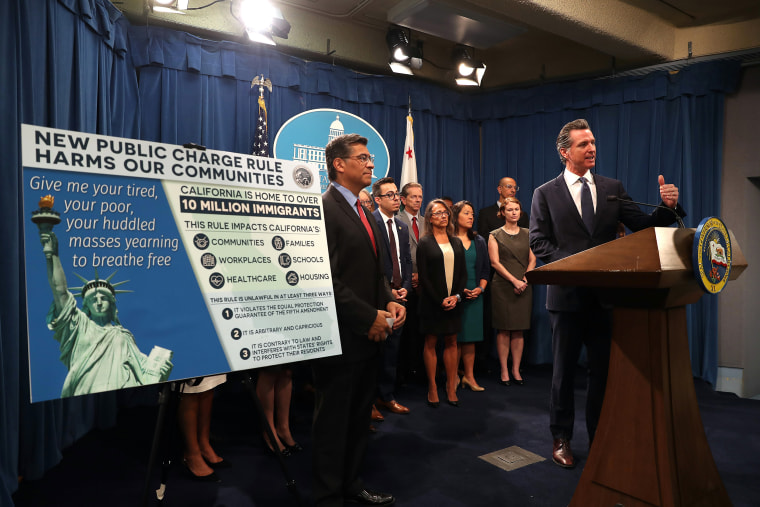A federal appeals court in New York blocked the Trump administration Wednesday from enforcing a policy that would make it far easier for the government to deny legal status to immigrants whose families use or are deemed likely to use publicly funded programs.
In a short order issued Wednesday, the 2nd U.S. Circuit Court of Appeals in Manhattan denied the Trump administration's attempt to lift a nationwide injunction barring the "public charge" rule from being implemented.
The order comes after other appeals courts stayed separate nationwide injunctions against the rule, which has been challenged in several states and by various nonprofits. Meanwhile, an injunction also remains in effect in Illinois.
The Department of Homeland Security previously defined "public charge" as someone who depended on cash assistance or government-funded long-term institutional care. The new rule expands the definition to include additional benefits such as food stamps, non-emergency Medicaid, certain prescription drug subsidies and housing vouchers.
And the rule would now define public charge as any immigrant household that uses — or is deemed likely to use at some point — one public benefit for 12 months during a 36-month period. Receipt of two public benefits in one month counts as two months, the rule noted.
Once labeled a "public charge," immigrants could be denied green cards, visas and other forms of legal immigration status.
The Trump administration argues that expanding the meaning of "public charge" helps "protect American taxpayers" and ensures "that noncitizens in this country are self-sufficient and not a strain on public resources."
'Dangerous and discriminatory'
Critics of the rule say it would disproportionately impact lower income immigrants and immigrants of color.
"Today, the court rejected the Trump administration's claims that it cannot wait to implement its dangerous and discriminatory public charge policy change," a litigation team in the case brought by Make the Road New York, The Legal Aid Society and the Center for Constitutional Rights said in a statement Wednesday afternoon.
The statement said the group was pleased the court upheld the injunction ordered by U.S. District Judge George Daniels, of the Southern District of New York, in October.
"We look forward to continuing our fight in court until a final decision is reached on the legality of the rule change, and we are thrilled that immigrants across the country remain protected," the litigation team said.
A spokesperson for U.S. Citizenship and Immigration Services, part of the Department of Homeland Security, said in a statement that the "public charge inadmissibility rule enforces long-standing immigration law that Congress reaffirmed in 1996."
"We are confident that an objective judiciary will see that this rule lies squarely within existing law," the spokesperson said.
The Justice Department declined to comment.
When Daniels first ordered the injunction, he called the public charge rule "repugnant to the American dream."
"It is a rule that will punish individuals for their receipt of benefits provided by our government, and discourages them from lawfully receiving available assistance intended to aid them in becoming contributing members of our society," he wrote.
Wednesday's order by the three-judge panel set an expedited schedule for the government's appeal, with the last briefs due Feb. 14. Oral arguments will be scheduled shortly afterward, the court said in the order.
Follow NBC Latino on Facebook, Twitter and Instagram.



